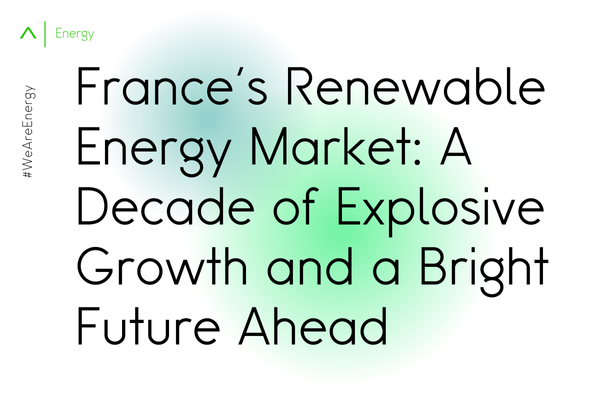France's Renewable Energy Market: A Decade of Explosive Growth and a Bright Future Ahead
21 Jun, 20245 minsFrance's Renewable Energy Market: A Decade of Explosive Growth and a Bright Future Ahead...

France's Renewable Energy Market: A Decade of Explosive Growth and a Bright Future Ahead
Over the past decade, France has witnessed a remarkable transformation in its renewable energy landscape. From a modest starting point, the country has rapidly scaled up its clean power capacity across solar, wind, hydro, and other technologies, establishing itself as a European leader in the shift from fossil fuels and nuclear to renewables. This article explores the key trends, drivers, and milestones that have propelled France's renewable energy market to new heights over the past ten years, and the bright future that lies ahead as the country charges towards its ambitious clean energy targets.
A Decade of Unprecedented Expansion
France's renewable energy market has experienced explosive growth over the past decade. In 2010, the country had just 4 GW of solar PV capacity and 5.9 GW of wind. Fast forward to 2020, and those numbers had skyrocketed to over 10 GW and 17 GW respectively. This four-fold increase in solar and nearly three-fold increase in wind capacity in just ten years underscores the incredible pace of change.
Other renewable technologies have also seen significant growth. Hydropower, long a mainstay of France's clean energy mix, expanded from 23 GW to over 25 GW. Bioenergy capacity doubled from 1.4 GW to 2.8 GW. Geothermal and marine energy, while still nascent, have begun to make inroads. This multi-pronged approach has diversified France's renewable portfolio and boosted its energy security.
Policy Support and Falling Costs
This rapid growth didn't happen by accident. Over the past decade, France has implemented a suite of supportive policies and incentives to accelerate renewable deployment. Feed-in tariffs, tender schemes, and tax breaks have provided long-term revenue certainty for developers. Streamlined permitting has cut red tape, while grid priority has eased integration. France has also leveraged its public finance institutions to derisk projects and crowd in private capital.
At the same time, technological advances and economies of scale have sent renewable energy costs plummeting. In 2010, the levelized cost of electricity (LCOE) for solar PV in France was over €300/MWh. By 2020, it had fallen to under €50/MWh - an astonishing 85% reduction. Onshore wind LCOE fell by 50% over the same period. These cost reductions have made renewables highly competitive with fossil fuels, even without subsidies. This confluence of policy support and improving economics has supercharged France's clean energy transition.
Integrating Variable Renewables
As the share of variable renewables like solar and wind has grown, France has had to adapt its electricity system to maintain reliability. Over the past decade, the country has invested heavily in grid modernisation, with new high-voltage lines, interconnectors, and smart grid technologies. It has also pioneered innovative solutions like virtual power plants and blockchain-based peer-to-peer trading.
France has also begun to tackle the crucial challenge of energy storage. In 2017, it launched a 100 MW battery storage tender, then the largest in Europe. It has since scaled up its ambition, targeting 7 GW of storage by 2030. Pumped hydro, currently at 5 GW, is being expanded. Power-to-gas and other long-duration storage technologies are being piloted. By developing a range of storage solutions, France is enhancing its flexibility and enabling higher shares of renewables.
Public Engagement and Social Acceptance
Perhaps most remarkably, France has achieved this renewable boom while maintaining strong public support. Through innovative policies like citizen-led energy cooperatives, shared solar programs, and participatory planning, the country has empowered communities to take ownership of the energy transition. Millions of French households have become prosumers, generating their own clean power.
France has also worked hard to ensure a just and inclusive transition. It has implemented retraining programs for fossil fuel workers, supported local economic diversification, and targeted renewables development in former mining regions. By prioritising social equity and dialogue, France has mitigated potential conflicts and built a broad coalition for change. This people-centred approach is a model for other countries to follow.
A Thriving Clean Energy Economy
France's renewable energy boom has not only cut emissions and enhanced energy security; it has also delivered significant economic benefits. Over the past decade, the renewable sector has been one of France's fastest-growing employers, with jobs more than doubling to over 100,000. France has leveraged its industrial strengths to become a clean energy export leader, with homegrown champions like EDF Renewables and Total Eren winning projects worldwide.
Renewable energy has also been a boon for France's regions, with wind and solar projects revitalising rural economies. The port of Cherbourg has been transformed into a hub for offshore wind manufacturing and services, supporting thousands of local jobs. Agricultural communities have benefited from the additional revenue streams of agrivoltaics and bioenergy. This geographic spread has ensured that the benefits of the energy transition are widely shared.
The Road Ahead: Scaling Up for 2030 and Beyond
While France's renewable achievements over the past decade are impressive, the country is not resting on its laurels. It has set even more ambitious targets for the coming years, aiming for 33% renewable energy by 2030 and carbon neutrality by 2050. To get there, it will need to further accelerate deployment, with plans for 44 GW of solar and 35 GW of wind by 2028. Offshore wind, long dormant in France, is finally taking off, with 7 GW targeted by 2030. Nascent technologies like floating solar, geothermal power, and tidal energy are being scaled up.
France is also looking beyond its borders, positioning itself as a clean energy hub for Europe. With its abundant renewable resources, strong grid connections, and central location, France is well-placed to export clean power to its neighbours. It is collaborating with Germany, Spain, and others on joint renewable projects and green hydrogen development. As Europe strives for net-zero emissions, France's renewable leadership will be increasingly valuable.
Of course, challenges remain. France must carefully manage the land use impacts and biodiversity risks of large-scale renewables. It needs to continue to invest in its aging grid infrastructure and develop new market designs for flexibility. And it must grapple with the future of its substantial nuclear fleet, which currently provides over 70% of its electricity. But with its strong track record and clear policy direction, France is well-equipped to navigate these obstacles.
The story of France's renewable energy market over the past decade is one of remarkable transformation. From a standing start, the country has become a global clean energy leader, with skyrocketing capacity, plummeting costs, and burgeoning public support. By combining ambitious targets, stable policies, and inclusive governance, France has demonstrated that a rapid, just energy transition is possible. As it looks ahead to 2030 and beyond, France is poised to build on this success and accelerate its shift to a 100% renewable future. The world will be watching closely as France writes the next chapter in its clean energy journey.



